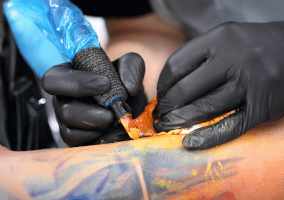Have you recently gotten a new tattoo and find yourself pondering the question, “Do I need to wrap my tattoo at night?” This common concern among tattoo enthusiasts stems from the desire to properly care for their new ink and ensure it heals correctly. In this blog post, we will delve into the importance of wrapping your tattoo at night, provide step-by-step explanations of the process, offer practical tips for aftercare, and conclude with key takeaways to help you maintain your tattoo’s vibrancy.
Why is wrapping your tattoo at night important in the world of tattoos? When you get a tattoo, your skin undergoes a significant trauma as needles penetrate deep layers, depositing ink along the way. It is essential to protect this fresh wound from external factors such as dirt, bacteria, and friction to promote proper healing. Wrapping your tattoo at night provides an additional layer of protection during the crucial initial stages of healing, preventing any unwanted contaminants from interfering with the process.
Step-by-Step Guide: Wrapping Your Tattoo at Night
- Before wrapping your tattoo, ensure that it has been cleaned and dried thoroughly.
- Apply a thin layer of tattoo-specific ointment recommended by your artist to keep the tattoo moisturized.
- Place a clean, breathable bandage or plastic wrap over the tattoo, ensuring it is not too tight to allow proper airflow.
- Secure the wrap in place with medical tape or a gentle bandage to avoid shifting during sleep.
- Remove the wrapping in the morning and gently wash the tattoo with lukewarm water to remove any excess ointment.
- Repeat this process each night until your tattoo has fully healed, typically within two to three weeks.
Practical Tips for Tattoo Aftercare
- Follow your tattoo artist’s aftercare instructions diligently to ensure optimal healing.
- Avoid exposing your tattoo to direct sunlight, swimming pools, or excessive moisture during the healing process.
- Moisturize your tattoo regularly with a recommended lotion or ointment to prevent dryness and itching.
- Avoid picking or scratching at your tattoo, as this can damage the healing skin and affect the final outcome.
Conclusion
In conclusion, wrapping your tattoo at night is a crucial step in the aftercare process to protect your new ink and promote proper healing. By following the step-by-step guide and practical tips provided in this blog post, you can ensure that your tattoo retains its vibrancy and longevity. Remember to consult with your tattoo artist for personalized recommendations and always prioritize proper aftercare to enjoy your new tattoo for years to come.
FAQs
Q: Do I need to wrap my tattoo at night if I have a small design?
A: Regardless of the size of your tattoo, it is recommended to wrap it at night to prevent any potential contamination during the healing process.
Q: Can I use regular plastic wrap to cover my tattoo at night?
A: It is best to use a breathable bandage or specialized tattoo wrap to ensure proper airflow while protecting your tattoo.











